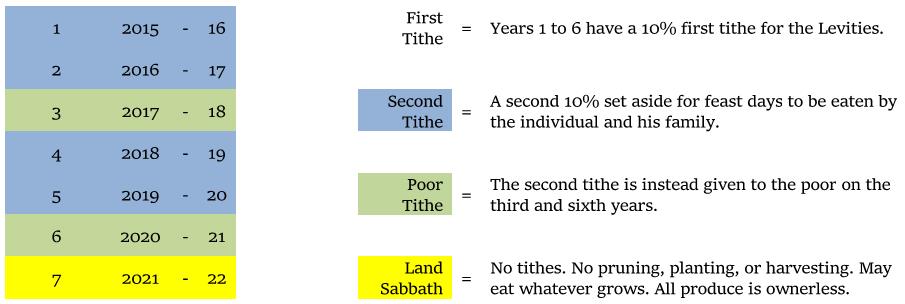|
Shalom everyone, here is my short study on everything you need to know about tithing. While we can't truly fulfill this command today without the Levitical Priesthood set up, we can honor this arrangement and give to the poor and needy as well as those doing Yah's work. I hope this information blesses you like it has me.
Before the Levites
General Principles
First Tithe (Ma'aser Rishon)
Second Tithe (Ma'aser Sheni)
Poor Tithe (Ma'sar Oni)
Heave Offering/Great Offering (Terumah Gedolah)
2 Comments
Shalom, I put together a scriptural reading plan that follows the Torah portions and reads thru the Bible in a year. It only works on iPhones for now but I'm hopeful an Android version will come soon. Download the app "ReadingPlan" from the app store, go to settings (three lines top left) and select "Reading Plan". Click "View Available Plans" and scroll down to find "Hebrew Roots Torah Study", it should be near the top, and download it. Set your start date to October 22, 2019 and adjust the other settings to your liking. Make sure you link to a Bible app so you can easily click on the readings to go straight to them under "Bible Link". Scroll down in settings and push "Mark Read to Today" and you're all set. I hope this blesses you in your walk. All praise to the Most High. notes by Tim Hegg A Root of Bitterness Bitterness is characterized in the Scriptures as a root—a deep growing reality, difficult to see or dig out, but always bringing forth its destructive fruit. The writer to the Messianic Jews says it this way:
Pursue peace with all men, and the sanctification without which no one will see the LORD. 15 See to it that no one comes short of the grace of God; that no root of bitterness spring- ing up causes trouble, and by it many be defiled; 16 that there be no immoral or Godless person like Esau, who sold his own birthright for a single meal. 17 For you know that even afterwards, when he desired to inherit the blessing, he was rejected, for he found no place for repentance, though he sought for it with tears. (Heb 12:14) In our Torah section for this Shabbat we have very similar words: Moreover, you have seen their abominations and their idols of wood, stone, silver, and gold, which they had with them); lest there shall be among you a man or woman, or fam- ily or tribe, whose heart turns away today from Adonai our God, to go and serve the gods of those nations; lest there shall be among you a root bearing poisonous fruit and worm- wood. (Deut 29:17–18) In both texts the idea of a “root” is found, and the “bitterness” specified by the Apostolic writer is no doubt a reference to the “poisonous fruit and wormwood” used as a metaphor by Moses. A sure “litmus test” for poisonous fruit is that it is bitter, and worm wood is, apparently, a leaf or seed (pod) that tastes very bitter Continue Reading Here. This last Shabbat we read an article from eliyah.com titled "Galatians proves that we should observe the Torah" check it out here. This is an important letter of Paul to understand correctly since it is used by many Christians to "prove" that we do not need to follow the Torah and are free to break Yah's commandments. I have heard a couple explanations for Galatians but this one seems to be one of the best. Check it out and leave a comment on what you think.
This week we talked about love and explored a short article on the Life-Changing Hebrew Roots of love along with 100 Bible verses about love. Love is typically defined as an intense emotion that we have towards others we care about. In the scripture we can see that "Love is patient and kind; love does not envy or boast; it is not arrogant or rude. It does not insist on its own way; it is not irritable or resentful; it does not rejoice at wrongdoing, but rejoices with the truth. Love bears all things, believes all things, hopes all things, endures all things." (1 Corinthians 13:4-7 ESV) These words are definitely truth, but do they tell us what love is? They tell us about how love works and give us insight into its correct application, but not so much what is consists of. Is it an emotion? A feeling inside? What does scripture tell us? "For this is the love of God, that we keep his commandments. And his commandments are not burdensome." (1 John 5:3 ESV) Here we find the definition of what love is. Our Father's commandments are the definition of love, the specifics of love. The commandments of the Most High are given out of love for the purpose of love. They tell us how to love. If you truly love someone you will not kill them, steal from them, testify falsely against them, or covet their belongings. If you truly love Yah you will not hold up other gods in his face, worship idols, use his name in a worthless way, or forget his Sabbath day to dishonor it. His commandments teach us what love is and how to love.
These commandments are not put in place to be a burden to us as some falsely teach. "All Scripture is breathed out by God and profitable for teaching, for reproof, for correction, and for training in righteousness" (2 Timothy 3:16 ESV) They are put in place for our benefit and are profitable in all aspects of our lives. When one lives by them and loves them they can easily see that our Father had our best interest at heart when he gave us the law, it is truly born out of love for love. |
Archives
January 2024
Categories
All
|

 RSS Feed
RSS Feed